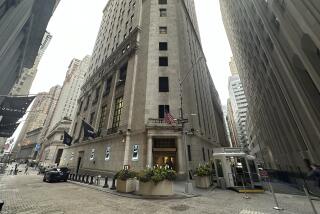Dow Falls 9.46; Dollar Plunges Again
Market Overview
Highlights of Tuesday’s market activity, compiled from Times staff and wire reports:
* A surge in shares of retailer Sears--which announced a major restructuring--wasn’t enough to make up for another slide in IBM’s stock, and the Dow Jones industrial average fell 9.46 points to 3,266.80. But the broader market closed slightly higher.
* Comments by a German central bank official suggested high German interest rates are here to stay, causing another major plunge in the dollar. Weak economic reports at home also hurt the dollar.
Stocks
Investors traded cautiously ahead of a key unemployment report due on Friday.
Winners narrowly topped losers, 867 to 810, on the New York Stock Exchange, where volume was 170.4 million shares, up from 157.5 million Monday.
Wall Street weathered another batch of poor economic reports, including a big drop in consumer confidence and a slide in the index of leading indicators. Many investors now appear to be hoping that Friday’s September unemployment report, if as bad as expected, will lead the Federal Reserve to reduce interest rates once again.
“The market seems to be treading water until the employment number,” said Robert Walberg, an analyst at MMS International.
Still, investors appeared cheered by Sears’ announcement of a major restructuring. The beleaguered retailer will turn its Dean Witter Financial Services Group and Allstate Insurance Group into separate, publicly traded companies.
The news sent Sears stock up 3 3/8 to 44 3/4.
But IBM sank 1 3/4 to a new 10-year low of 81. After the market closed, the computer giant announced that it will launch a new round of plant closings and cut twice as many jobs as it originally expected.
IBM’s announcement could cast a pall over the entire market today by fanning new fears of the weak economy’s effect on corporate profits, analysts said.
Among other highlights:
* Railroads were among the few strong groups, after brokerage Morgan Stanley repeated buy ratings on four firms: Conrail, up 1 3/8 to 40 5/8; CSX, up 1 to 59; Norfolk Southern, up 3/8 to 55 3/4, and Union Pacific, up 5/8 to 54 5/8.
* Some technology stocks gained. Microsoft jumped 1 3/4 to 78 3/4, Oracle rose 1 to 20 3/8, Autodesk leaped 3 1/4 to 47, and Motorola was up 1 1/4 to 87 1/4.
* Many health care stocks rebounded from their recent drubbing. Medical Care America was up 1 1/2 to 23 5/8, Merck added 3/4 to 44, Bristol Myers Squibb rose 1 1/8 to 63 3/4, and U.S. Healthcare jumped 2 3/4 to 43 3/8.
* Tenneco rose 1 1/8 to 36 1/2 on anticipation that the conglomerate will show improved earnings in the third quarter.
* Times Mirror, parent of the Los Angeles Times, dropped 1 3/4 to 31 1/4. The company warned that third-quarter operating results for its newspaper group will be “considerably lower” than 1991 results, largely because of weak ad revenue.
Overseas, European markets stabilized. In London, the 100-share Financial Times index gained 5.5 points to 2,565.5. Frankfurt’s DAX index edged up 1.22 points to 1,476.26.
But in Tokyo, the Nikkei average fell 224.52 points to 17,748.09. The drop reflected the failure of public funds to support the market and fears about the strong yen.
Currency
The dollar plunged against the German mark on fresh reports showing weakness in the U.S. economy.
Also, a top official of the German central bank, the Bundesbank, was quoted as saying German interest rates may have to remain high for at least the next six months. That would draw new money to German bonds and bank CDs.
The dollar was slammed in European trading overnight and continued falling through the day, ending at 1.413 German marks in New York, compared to 1.451 Monday.
With markets settling down after several weeks of turmoil in Europe’s Exchange Rate Mechanism, traders have refocused on U.S. economic fundamentals.
“As soon as players got a whiff of calm in the ERM, they were ready to abandon the comfort and safety of the dollar for the more attractive returns of the Euro-currencies,” a U.S. bank dealer said.
The dollar also hit a new low against the Japanese yen, which lately has been sought out as a safe-haven currency. The dollar closed at 119.25 yen, compared to 119.55 Monday. Early in the session it touched a record low of 119.10 yen.
Top Japanese policy makers expressed public dissatisfaction with the record high yen, hoping to discourage further buying--but the yen continued to appreciate against the dollar.
Against the British pound the dollar weakened to $1.787 from $1.732.
Credit
Bond prices eased, reflecting doubts that the Federal Reserve will be able to lower interest rates despite more news of economic weakness.
The price of the Treasury’s 30-year bond fell 9/32 point, or $2.81 per $1,000. Its yield, which rises when prices fall, rose to 7.36% from 7.34% Monday.
The federal funds rate, the interest on overnight loans between banks, fell to 2.75% from 3.375%.
Commodities
Orange juice futures slumped to six-week lows on the Cotton Exchange in New York, weighed down by a huge Florida crop in the making.
The November delivery of frozen orange juice futures plunged 3.80 cents a pound to $1.048.
Elsewhere, light, sweet crude oil for delivery in November settled at $21.67 per barrel, down 9 cents on the New York Merc.
Gold for October climbed 40 cents to $348.20 an ounce. December silver was 0.5 of a cent lower at $3.75.
Market Roundup, D6
More to Read
Inside the business of entertainment
The Wide Shot brings you news, analysis and insights on everything from streaming wars to production — and what it all means for the future.
You may occasionally receive promotional content from the Los Angeles Times.










